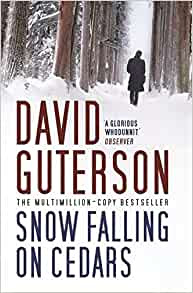Every now and then I get a round robin email from a self-promoting author. They are rarely interesting. In January, however, I received a nicely put together, well targeted message from an author named Philip Bowne:
I hope you’re keeping well and enjoying a good start to 2021. I also hope that you won’t mind me writing out of the blue - I found your details on the Reading Groups for Everyone website, while I was searching for book clubs in the Ox/Bucks area. I’m a local author - I grew up in Bicester. My first novel Cows Can’t Jump was published last September.
When this most recent lockdown in the UK was announced, I decided to reach out to Book Clubs and offer an Author Book Club, to share my writing and hopefully provide a much needed boost for people. My debut novel Cows Can’t Jump was published at the end of 2020. It’s a fun coming-of-age story that transports the reader across central Europe. It won the Spotlight First Novel Prize and was shortlisted for The Guardian’s Not the Booker Prize.
One of the great disappointments of publishing my debut during the pandemic has been the inability to connect with readers. I am hoping that this might go some way in remedying that!
If your group would be interested in reading the book, I would be delighted to offer an online Author Q&A session for the group if they wish. It would be fun to enjoy a drink, discuss the novel’s themes, characters, and ask any questions they may have. All in all, I want it to be a bit of fun, to help bring people together during lockdown, and to help spread the word about my novel! Debuting in 2020 was – as you can imagine – a bit of a nightmare, as it’s so difficult to connect with readers. I’m hoping the book club can help with that.
If you are interested in finding out a bit more information, I’d be more than happy to discuss further! For a little more information on the book and myself: https://philipbowne.com
So I got in touch, explained how we choose our books and promised to pass his book details to Sue. We batted a couple of emails back and forth and agreed on 2 possible dates, for his book club idea, if we we would like to give his book a go: 25th March or the 8th April.
If we decide we are up for a meeting with Phil, then this is the book.
Cows Can't Dance by Philip Bowne
 How far would you go for love?
How far would you go for love?
Winner of the Spotlight First Novel prize, Philip Bowne's debut novel is an explosive coming-of-age odyssey. 18-year-old Billy is desperate to leave home. He's working the ultimate dead-end job as a grave-digger. His Grandad's engaged to a woman half his age, his Dad's become obsessed with boxing, and his Mum's certainly having an affair. Everything is changing, and Billy hates it.
Meeting the older, mysterious Eva, though, changes everything. She's passionate about Russian literature, Gary Numan, windfarms and chai tea, and Billy gambles everything for a chance to be with her. His scramble across Europe involves hitch-hiking with truckers, walking with refugees, and an encounter with suicidal cows. But the further he goes, the harder it is to be sure what he's chasing - and what he's running from.
This book is for everyone who wants to break out and follow their dreams.
By way of back up, or add on, we have 2 other books to consider:
Goodbye to Berlin by Christopher Isherwood
First published in 1939, this novel obliquely evokes the gathering storm of Berlin before and during the rise to power of the Nazis. Events are seen through the eyes of a series of individuals, whose lives are all about to be ruined.
Goodbye to Berlin, evokes the glamour and sleaze, excess and repression of Berlin society. Isherwood shows the lives of people under threat from the rise of the Nazis: a wealthy Jewish heiress, Natalia Landauer, a gay couple, Peter and Otto, and an English upper-class waif, the divinely decadent Sally Bowles.
Vesper Flights by Helen MacDonald
Animals don't exist to teach us things, but that is what they have always done, and most of what they teach us is what we think we know about ourselves.
From the bestselling author of H is for Hawk comes Vesper Flights, a transcendent collection of essays about the human relationship to the natural world.
Helen Macdonald brings together a collection of her best-loved writing along with new pieces covering a thrilling range of subjects. There are essays here on headaches, on catching swans, on hunting mushrooms, on twentieth-century spies, on numinous experiences and high-rise buildings; on nests and wild pigs and the tribulations of farming ostriches.
Vesper Flights is a book about observation, fascination, time, memory, love and loss and how we make the world around us. Moving and frank, personal and political, it confirms Helen Macdonald as one of this century's greatest nature writers.
We will meet to discuss our current book: The Pants of Perspective by Anna McNuff at 8pm on Thursday 18th February by Zoom. We can decide then on Phil's offer to meet and whether to read one book, or perhaps two over the coming Spring months.



















